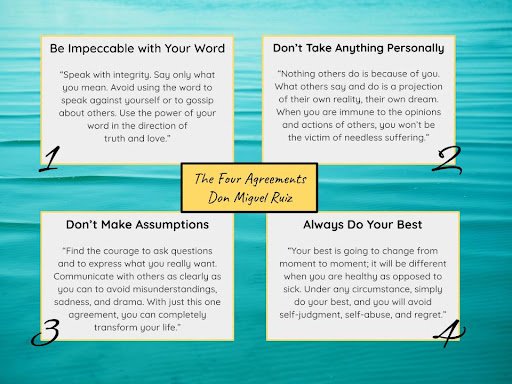Navigating The Four Agreements
If you haven’t read The Four Agreements: A Practical Guide to Personal Freedom by Don Miguel Ruiz, consider finding a copy or checking it out from your local library, although it really is a staple to have on the shelf. The Four Agreements seem simple enough in theory but in reality it can be quite challenging. If we can keep them in the forefront of our mind on a daily basis it has the potential to have a huge impact on our lives. The Four Agreements are meant to be used as a tool to live by for personal freedom from the suffering we needlessly create in our minds.
1st Agreement: Be Impeccable with Your Word
Ok, let’s start with the first agreement and break it down, “be impeccable with your word”.
This puts the spotlight on how we talk to ourselves, you know that harsh inner critic that is constantly beating ourselves up? Can you begin to be more mindful and gentle with how you talk to yourself? How you speak to others is important too, Ruiz guides us to “say only what you mean and use the power of your word in the direction of truth and love.”
2nd Agreement: Don’t Take Anything Personally
The second agreement might be one of the most difficult, “don’t take anything personally.”
Perhaps 99% of the time it isn’t about you. Ruiz reminds us that “nothing anyone does is because of you.” Keep in mind that everyone is responsible for their own choices of how they are reacting or responding. Luckily, we can use the practice of mindfulness to catch ourselves before we latch on to thoughts of taking things personally. If you begin to lean into this reminder and practice it daily you might save yourself from needless rumination and suffering.
3rd Agreement: Don’t Make Assumptions
The third agreement has the potential to change your life if you practice it daily, “don’t make assumptions.” Let me start by saying that we are humans and I would guess that we fall into this trap at least 50 times a day. Again, use your mindfulness to begin noticing and catching yourself when you make an assumption about what another person is thinking or feeling. I know we gather information about what people are saying and observe behaviors and actions, and certainly that is good information to take into account, but we perceive things with our own unique lens. The take-away here is to catch yourself and then use your curiosity and if possible ask for confirmation to check your assumption. For example, you were hanging out with friends the other day and said something in particular that you are now second guessing and wonder if they now think you are a fool for saying that. Perhaps you ruminate and lose 2 nights of sleep assuming your friends think you are a fool for saying something stupid. If you latch on to this assumption as though it is true and spin a story in your head, I guarantee it will be painful and cause suffering. Take a breath and observe your thoughts and assumptions and consider reaching out to the friend(s) and checking in to ask. Chances are they will either not even remember the comment or will reassure you that they do not think you are a fool. If for some reason they were offended, well now you have an opportunity to mend and ask for forgiveness.
4th Agreement: Always Do Your Best
The 4th agreement is “always do your best.” I love this last agreement because it can become a nice mantra or affirmation such as “I’m doing the best I can and that is enough.” Let me clarify this agreement is not about being THE BEST, it is about recognizing the energy you have in that moment and the compassion and care in your heart combined to meet yourself where you are in the moment and take the actions that you are able, AND acknowledging for yourself that it is enough and acceptable. Honestly, that is self-compassion in action and a gift we can give to ourselves.
I’ll conclude this topic with a reminder to be gentle with yourself, even with practicing the 4 agreements, because after all, you are doing the best you can, and that is enough.❣️🐨
Be gentle with yourself,


